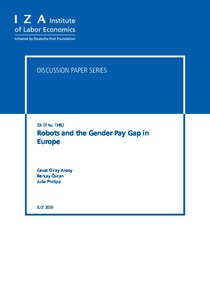Robots and the gender pay gap in Europe

Aksoy, Cevat G. ; Ozcan, Berkay ; Philipp, Julia
Institute of Labor Economics, Bonn
IZA - Bonn
2020
48 p.
wage differential ; automation ; gender ; robots ; manufacturing industry
Discussion Paper
13482
Wages and wage payment systems
English
Bibliogr.
"Could robotization make the gender pay gap worse? We provide the first large-scale evidence on the impact of industrial robots on the gender pay gap using data from 20 European countries. We show that robot adoption increases both male and female earnings but also increases the gender pay gap. Using an instrumental variable strategy, we find that a ten percent increase in robotization leads to a 1.8 percent increase in the gender pay gap. These results are mainly driven by countries with high levels of gender inequality and outsourcing destination countries. We then explore the mechanisms behind this effect and find that our results can be explained by the fact that men at medium- and high-skill occupations disproportionately benefit from robotization (through a productivity effect). We rule out the possibility that our results are driven by mechanical changes in the gender composition of the workforce nor by inflows or outflows from the manufacturing sector."
Digital
The ETUI is co-funded by the European Union. Views and opinions expressed are however those of the author(s) only and do not necessarily reflect those of the European Union or the ETUI.